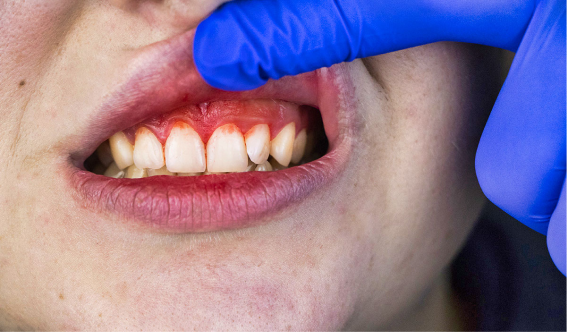Can I treat gum disease at home, or do I need professional treatment?
Gum disease can cause pain, bleeding, and anxiety, undermining your smile and self-assurance. You can take action, which is fantastic news. This article discusses about Gum disease treatment, whether at home or with the help of a dentist.
Gum Disease: Fighting on the Inside
Periodontal disease, or gum disease, affects a lot of people’s mouths. Modest signs like redness and swelling may go unnoticed in its early stages. But if it’s not treated, it can progress to a much more severe condition that risks your teeth and health.
Gingivitis and periodontitis are the two most common forms of gum disease.
- Gingivitis: Periodontal disease typically results in red, swollen, and bleeding gums as its initial symptoms.
- Periodontitis: A more severe form of gum disease in which pockets form when the gum and bone tissue recede from the teeth.
Is There a Home Remedy for Gum Disease?
People with moderate cases of gingivitis can benefit significantly from taking preventative measures at home. Here are some practices and cures you can try at home:
- Thorough Oral Hygiene: Use fluoride toothpaste and brush your teeth at least twice a day, including floss or an interdental brush to get in between your teeth.
- Gum disease sufferers can find relief from their symptoms with an antiseptic mouthwash. For advice, see your dentist.
- Warm salt water rinsing helps reduce gum irritation and speed up healing. Twice a day, give your mouth a gentle 30-second rinse.
- Gel made from turmeric, which has anti-inflammatory and antibacterial qualities. The gums should be treated with a turmeric gel.
- Oil pulling involves rinsing the mouth for 15 to 20 minutes with coconut or sesame oil to remove dangerous microorganisms.
- Make some changes to your way of life, such as giving up cigarettes and drinking less alcohol. Gum disease can be made worse by these practices.
- Although these self-care practices can help reduce the discomfort associated with minor gum disease, they should not be used instead of seeing a dentist. You should see a dentist immediately if your gum disease does not improve or worsen.

Before/After image of Gum disease treatment
The Importance of Getting Help From a Professional
Professional help is essential for more complex cases. Reasons why-
- Professional Diagnosis: Dentists can determine the severity of your gum disease and provide you with specific recommendations for therapy.
- Plaque and tartar buildup below the gumline can be removed by a professional dental cleaning procedure called deep cleaning (scaling and root planing).
- Your dentist may recommend antibiotics to treat and stop the infection from spreading.
- Flap surgery and bone grafting are two examples of surgical procedures that may be required in advanced cases of periodontitis.
- Ongoing Care: Scheduling regular dental examinations is essential to preventing gum disease from returning and catching it early when it occurs.
- Stopping the growth of gum disease with professional Gum disease treatment is an effective way to protect your dental health and keep your teeth intact.
Concluding Remarks
The good news is that gum disease can be treated despite its prevalence. Mild cases can be treated successfully at home, but more severe cases require professional Gum disease treatment. Maintain a high vigilance regarding your oral health, see a dentist at the first sign of trouble, and devote yourself to a thorough oral care program for the best results.
When you’re happy and healthy, it shows in your smile. Maintaining healthy, vibrant gums and a smile that exudes confidence requires a combination of home maintenance and professional assistance.



Leave a Reply
Want to join the discussion?Feel free to contribute!